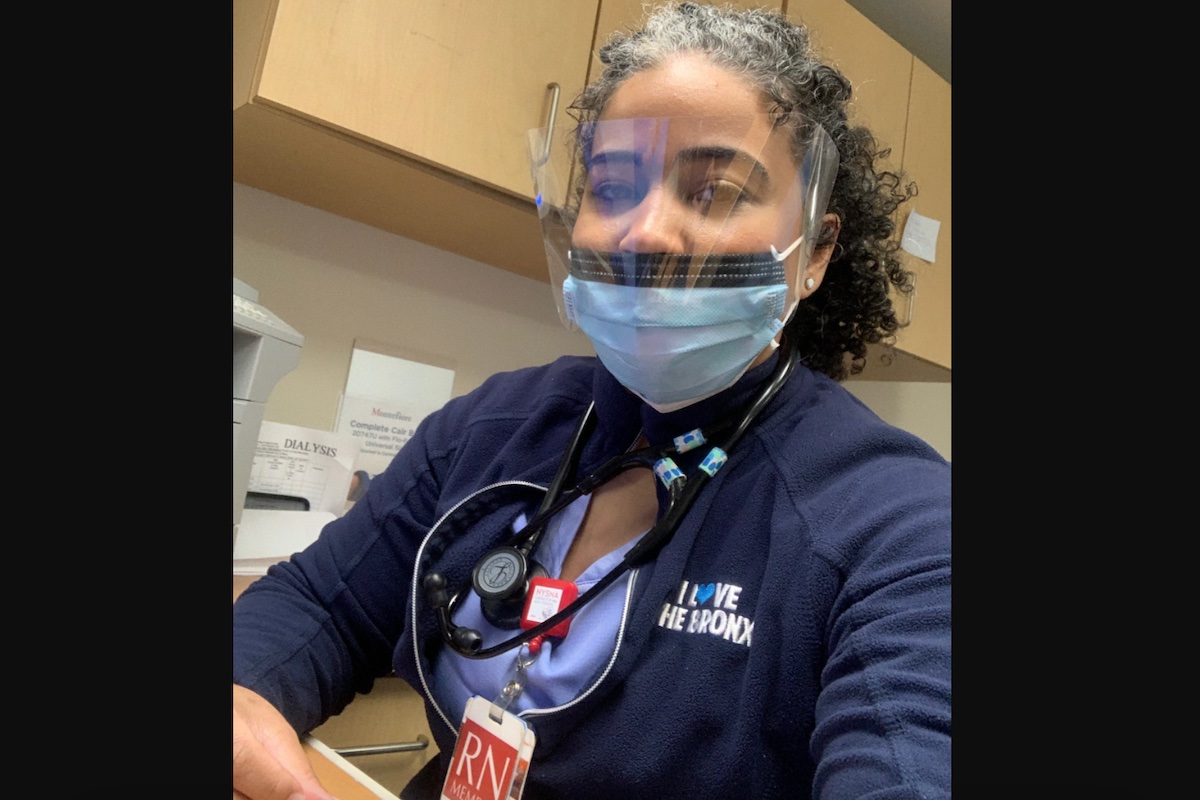

Via the Twitter account of Assemblymember Karines Reyes
By Assemblymember Karines Reyes
Before becoming a representative for the Bronx in the New York State Assembly, I was a registered nurse at the Montefiore Einstein Hospital. At the height of the pandemic, I volunteered to go back because my district, my borough, my city needed me. I worked three to four days a week. Basically, whenever they called me to cover a shift, and I was available I would go in. It was clear to me right away that the situation was dire, deadly, and escalating, based on the influx of rapid response calls I heard each day.
Some hospitals call these “code blues,” but they’re known as “CACs” here at Montefiore. A CAC means a patient is in serious trouble, has likely gone into full cardiac arrest, and needs immediate intervention. Before the pandemic, you could work an entire shift and not hear a single rapid response call over the loudspeaker. Weeks would go by without an alarm. While this is something we train for, I never expected to experience CACs at this magnitude. We were hearing them 10 or 20 times a day.
It’s important to understand that we only had two CAC teams working around the clock. There would be times when one team would be in the room with me and get called to another in the middle of trying to save a life. We knew early on that this wasn’t like the flu; it wasn’t like anything we had ever seen.
This experience gave me a first-hand look at just how awful things were, long before the gravity of the situation resonated with the general public. I also recognized the extreme ambiguity around health and safety guidelines and the fact that there were no apparent means of enforcing what few regulations existed.
As a nurse in the oncology ward, regulations said we didn’t have to wear masks unless entering the room of a patient in isolation. However, nurses in the emergency room taking care of COVID-19 patients began wearing their masks throughout their entire shifts; they were more vulnerable to infection than ever before.
When I first started coming to the hospital, I would check-in at the nurses’ station and get a brown paper bag with PPE that was supposed to last an entire week. It would be one N-95 mask and multiple surgical masks that we were to wear over the N-95 to keep it clean. We had one face shield. Gowns were kept outside the patients’ rooms, but we started to reuse them because we were running out.
Shortly after, they set up a station at the hospital door where we would receive PPE. But even then, in a medical setting, the instructions weren’t clear. This haphazard approach resulted in unclear guidance as to what we should be doing to protect ourselves and our patients. I could only imagine what other essential industries were doing to keep their employees and customers safe. It all made me realize that state leaders like myself needed to take matters into their own hands and do more to protect workers on the front lines of the COVID-19 battle.
There are necessary and fairly simple precautions that can be taken to provide workers with protection. That’s why, in my position as an Assemblymember, I introduced the New York Health and Essential Rights Act, or NY HERO Act, to provide uniform guidelines for essential industries that keep our communities and economy up and running. Recently, the state Senate passed this legislation, and I urge my Assembly colleagues to soon follow suit.
This legislation is especially important for immigrant New Yorkers. As a first-generation immigrant from the Dominican Republic, I understand how hard immigrant families have to work to make ends meet. Often, our immigrant workers are not only unprotected, but they’re treated like they’re expendable. That’s always in the front of my mind. That’s a lived experience for me. I witnessed it with the women who raised me—both my mom and my aunt worked in factories. I know the situation is no different for far too many people today.
I also am acutely aware that the service and health-care industries are dominated by women. We are working as nurses, as supermarket cashiers, in restaurants, and at the laundromat. Women —especially immigrant women— are overrepresented in all these forward-facing service industries, which is why the COVID-19 positivity rates have been so high for them. They have paid a disproportionate price in this pandemic —both when it comes to infection rates and job losses— and must be protected.
Being back at the hospital and experiencing quarantine made me appreciate life and health differently. We all should be taking this more seriously and handling this pandemic responsibly while preparing for future airborne disease outbreaks. Today, I’m happy to be alive, and I’m doing everything in my power to keep my neighbors, friends, and family safe as well. That includes championing the NY Hero Act, which I will continue to do in hopes that it becomes law in time to protect workers and hopefully save lives.
***
Assemblymember Karines Reyes was born in the Dominican Republic, subsequently moved to Puerto Rico and then immigrated to the U.S. when she was 6. She has been a Bronx resident for two decades and received her nursing degree in 2013. She has represented the 87th Assembly District since 2019.


